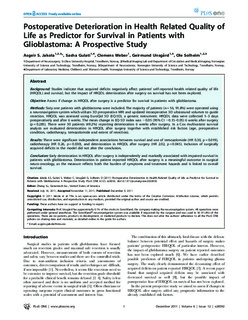| dc.contributor.author | Jakola, Asgeir S | |
| dc.contributor.author | Gulati, Sasha | |
| dc.contributor.author | Weber, Clemens | |
| dc.contributor.author | Unsgård, Geirmund | |
| dc.contributor.author | Solheim, Ole | |
| dc.date.accessioned | 2015-10-30T11:16:26Z | |
| dc.date.accessioned | 2015-11-26T12:40:56Z | |
| dc.date.available | 2015-10-30T11:16:26Z | |
| dc.date.available | 2015-11-26T12:40:56Z | |
| dc.date.issued | 2011 | |
| dc.identifier.citation | PLoS ONE 2011, 6(12) | nb_NO |
| dc.identifier.issn | 1932-6203 | |
| dc.identifier.uri | http://hdl.handle.net/11250/2365868 | |
| dc.description.abstract | Background:
Studies indicate that acquired deficits negatively affect patients' self-reported health related quality of life (HRQOL) and survival, but the impact of HRQOL deterioration after surgery on survival has not been explored.
Objective:
Assess if change in HRQOL after surgery is a predictor for survival in patients with glioblastoma.
Methods:
Sixty-one patients with glioblastoma were included. The majority of patients (n = 56, 91.8%) were operated using a neuronavigation system which utilizes 3D preoperative MRI and updated intraoperative 3D ultrasound volumes to guide resection. HRQOL was assessed using EuroQol 5D (EQ-5D), a generic instrument. HRQOL data were collected 1–3 days preoperatively and after 6 weeks. The mean change in EQ-5D index was −0.05 (95% CI −0.15–0.05) 6 weeks after surgery (p = 0.285). There were 30 patients (49.2%) reporting deterioration 6 weeks after surgery. In a Cox multivariate survival analysis we evaluated deterioration in HRQOL after surgery together with established risk factors (age, preoperative condition, radiotherapy, temozolomide and extent of resection).
Results:
There were significant independent associations between survival and use of temozolomide (HR 0.30, p = 0.019), radiotherapy (HR 0.26, p = 0.030), and deterioration in HRQOL after surgery (HR 2.02, p = 0.045). Inclusion of surgically acquired deficits in the model did not alter the conclusion.
Conclusion:
Early deterioration in HRQOL after surgery is independently and markedly associated with impaired survival in patients with glioblastoma. Deterioration in patient reported HRQOL after surgery is a meaningful outcome in surgical neuro-oncology, as the measure reflects both the burden of symptoms and treatment hazards and is linked to overall survival. | nb_NO |
| dc.language.iso | eng | nb_NO |
| dc.publisher | Public Library of Science | nb_NO |
| dc.title | Postoperative deterioration in health related quality of life as predictor for survival in patients with glioblastoma: a prospective study | nb_NO |
| dc.type | Journal article | nb_NO |
| dc.type | Peer reviewed | en_GB |
| dc.date.updated | 2015-10-30T11:16:26Z | |
| dc.source.volume | 6 | nb_NO |
| dc.source.journal | PLoS ONE | nb_NO |
| dc.source.issue | 12 | nb_NO |
| dc.identifier.doi | 10.1371/journal.pone.0028592 | |
| dc.identifier.cristin | 880369 | |
| dc.description.localcode | © 2011 Jakola et al. This is an open-access article distributed under the terms of the Creative Commons Attribution License, which permits unrestricted use, distribution, and reproduction in any medium, provided the original author and source are credited. | nb_NO |
